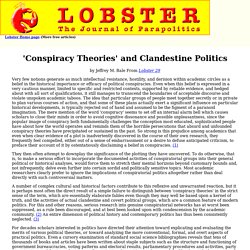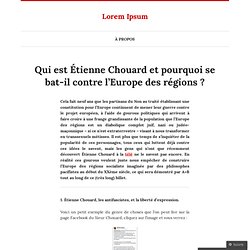

'Conspiracy Theories' and Clandestine Politics. Very few notions generate as much intellectual resistance, hostility, and derision within academic circles as a belief in the historical importance or efficacy of political conspiracies.

Even when this belief is expressed in a very cautious manner, limited to specific and restricted contexts, supported by reliable evidence, and hedged about with all sort of qualifications, it still manages to transcend the boundaries of acceptable discourse and violate unspoken academic taboos. The idea that particular groups of people meet together secretly or in private to plan various courses of action, and that some of these plans actually exert a significant influence on particular historical developments, is typically rejected out of hand and assumed to be the figment of a paranoid imagination. Rumeurs complotistes : de la croyance à la défiance. Les attentats de l’année 2015 à Paris et de 2016 à Bruxelles ont fait renaître des rumeurs de complot bien connues, qui fonctionnent à la défiance à l’égard des médias et du pouvoir.

Ces rumeurs témoignent de l’activité de groupes sociaux ou politiques qui utilisent à plein les nouvelles technologies. Mais la résistance s’organise aussi, et ces discours paraissent désormais dévalués lorsqu’ils essaient d’entrer sur le marché de l’information. « Chers ami(e)s Message de la Préfecture de Police de Paris, demandant de limiter les déplacement dans les centres commerciaux ce weekend, menace sur tout le territoire français, Paris comme en province, à faire tourner largement. Merci (Info reçue en messagerie professionnelle interne police nationale) ». Ce message, dont nous avons conservé la ponctuation et la scansion originales, a massivement circulé sur les téléphones portables le 12 mars 2016, en fin de matinée.
Conspiracy craze: why 12 million Americans believe alien lizards rule us. According to a Public Policy Polling survey, around 12 million people in the US believe that interstellar lizards in people suits rule our country.

We imported that particular belief from across the pond, where professional conspiracy theorist David Icke has long maintained that the Queen of England is a blood-drinking, shape-shifting alien. Conspiracy theories in general are not necessary bad, according to psychologists who study them. “If we were all completely trusting, it would not be good for survival,” explains Rob Brotherton, an academic psychologist and author of Suspicious Minds: Why We Believe Conspiracy Theories. “Sometimes people really don’t have our best interests in mind.” But when people leap from thinking their boss is trying to undermine them to believing their boss might be a secret lizard person, they probably cross from what psychologists refer to as “prudent paranoia” into illogical territory. And there are a lot of illogical ideas to pick from. Qui est Étienne Chouard et pourquoi se bat-il contre l’Europe des régions ?
Cela fait neuf ans que les partisans du Non au traité établissant une constitution pour l’Europe continuent de mener leur guerre contre le projet européen, à l’aide de gourous politiques qui arrivent à faire croire à une frange grandissante de la population que l’Europe des régions est un diabolique complot juif, nazi ou judéo-maçonnique – si ce n’est extraterrestre – visant à nous transformer en transsexuels métisses.

Il est plus que temps de s’inquiéter de la popularité de ces personnages, tous ceux qui luttent déjà contre ces idées le savent, mais les gens qui n’ont que récemment découvert Étienne Chouard à la télé ne le savent pas encore. En réalité ces gourous veulent juste nous empêcher de construire l’Europe des régions socialiste imaginée par des philosophes pacifistes au début du XXème siècle, ce qui sera démontré par A+B tout au long de ce (très long) billet. 1. Étienne Chouard, les antifascistes, et la liberté d’expression. 2. C’est pas pour dire mais c’est le néant absolu. 3.
Conspiracy theories: the science behind belief in secret plots. With constant revelations about government surveillance and possible impending war, this must be a fertile time for conspiracy theories.

You know when you put the bins out and you realise there's a bag in the corner that you'd forgotten about and you pick it up but it's so old it splits and you are suddenly surrounded by swarms of furious flies and you run indoors screaming and spend three hours in the shower, shuddering? I imagine it's a bit like that. I'm involved in several conspiracies (apparently). When Channel 5 aired a shockingly non-critical show about moon landing conspiracies, I responded by "confessing" it was true, and inventing other "true" conspiracies, to emphasise how ludicrous the notion was. I made up conspiracies so far-fetched that I thought nobody could possibly believe them, revealing my naiveté about what people are able/willing to take at face value.
What is it that compels people to cry conspiracy in response to even relatively minor events? Sensibiliser les élèves aux théories du complot.